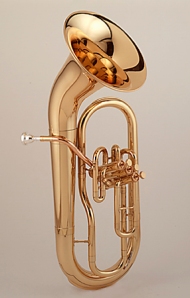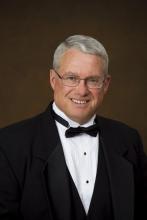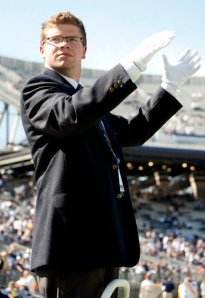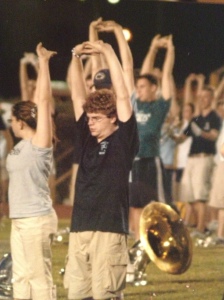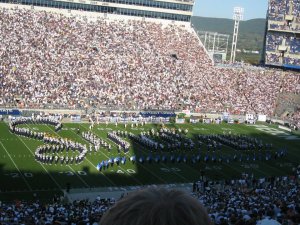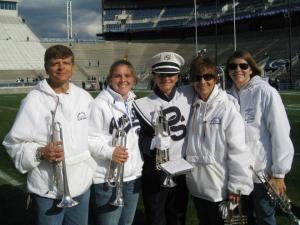In the last part of our interview, Karen explains what her job is like, teaches me some shorthand, and gives some really great advice.
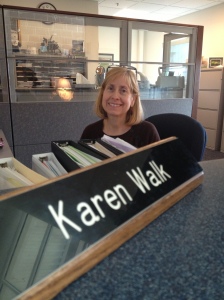
Blue Band Staff Assistant Karen Walk at her desk in the Blue Band Building
Me: The Blue Band Office used to be in Chambers. How was working there?
Karen: Well, it’s the whole adage of “you don’t miss what you never had.” You didn’t know any better, so you worked with what you had. We knew we were cramped, we knew it was inconvenient to go across the street to the Music Building for off-season instrument storage. We knew it was even more inconvenient to have the trailers. We knew it was inconvenient, but it was what was there. It was what you worked with. We didn’t have a very good truck, and we just dealt with it. But Chambers itself, the College of Education, was fine. Art Ed and Music Ed were all over there with me at the time so it was nice work-wise, but what the Blue Band didn’t have was really inconvenient. Dr. Diehl had a huge office, Dr. Bundy had a pretty small office, and we all had to go to the School of Music for everything because we didn’t have any storage space in ChambersBuilding at all.
Me: Ya, I know my dad had to keep his uniform in his dorm room.
Karen: That’s right, you were issued a uniform on audition day and you kept it. That’s why the garment bags went by the wayside because they would be dragged across fields. The garment bags were a real issue back then. Even in your dad’s day, it was probably less numbers. So you figure by the time I was there in ’87 it had grown to 250 I think. So the more members you had, the more instruments you had and the more uniforms you had, the less the storage space became because you were getting more and more and more. So it was tough as I look back, it felt tough, but at the time you just did it.
Me: So working here has been a lot more convenient?
Karen: Ya! You look back and you think, “How did we do it?” It’s sort of like you look back and think how did the people who lived in the Depression live in the Depression? You didn’t have this and you didn’t have that and you got an orange for Christmas. Nobody had new clothes. My mom always said, “We didn’t know what we didn’t have. That’s all we knew!” So it’s that feeling. But being here, it’s all about the use of time. We don’t have to take time in the summers to unload the trailers, and we don’t have to take time to clean a shack that we had over there. We don’t have to take time to cram all that stuff in Room 3 in the Music Building. It just flows better. Everything flows better. The physical library, look at that. Square footage, the room we had in Chambers building was probably comparable square footage, but you didn’t have a library system. You had file cabinets sitting on top of file cabinets and you’d crawl on a table to get to a drawer and that file cabinet would tip! So convenience-wise, it just works smoother. We have an archive room, an AV room, things have a home. You know where everything is.
Me: Describe a typical day in your job during a Blue Band season.
Karen: Well, a typical day is coming in and constantly trying to be one step ahead. So it’s always thinking ahead. Is it a travel week, is it a home week, is it an away week? And what needs to be done in today’s rehearsal that’s going to accomplish the most to get towards the goal of what’s going on for that week. What does Dr. Bundy need today? Do we need to gather anything travel or business-wise, or is it just doing office stuff and I don’t need anything on the field. Is it a guide/squad leader day? Are there special charts that need to be done today? Are we playing music where we need to be sure that the contracts and licenses are done and ready? Do I need to give the librarians something that they need on the field? So it’s constant communication.
A typical day is trying to be one step ahead to make sure each officer knows what they need to do to help the director, what I need to do, what the grad students need to do. A typical day is organization. It’s so variable, it’s hard to give a typical day because it all depends if it’s an away week, a travel week, a home week, an off week, an audition week, a camp week, a performance like Bandorama week. It’s so variable that a typical day doesn’t really exist, except that it’s busy. Are we in basketball season yet? Are we in volleyball season yet? Is Dr. Bundy teaching Music Ed classes in addition to trying to do Blue Band? Is Greg [Drane] teaching Music classes? Is it an away week for the whole band? Is it an away week for a pep band? So no two days are never alike, that’s why when they ask me to write my job description and write a daily thing up, how do I start? How do I tackle it, how do I cover it? You have to refine and ask the question, what’s a typical day like in a full-band away week? Then you can refine a little more.
Me: That sounds like so much work!!
Is it hard to see members come into the band and grow and then see them leave again?
Karen: It’s horrible. Horrible. (pause) And it’s me next. You get attached. (She motions at Caleb Rebarchak sitting at his desk) There sits one of them. But he came back. I really get attached, and I have to keep remembering that they leave and they get to come back and do Homecoming. I never have to say goodbye. Someone will say “We’re coming in, this is the last day we’re here, we’re coming in.” I don’t come. I couldn’t come back. It’s hard, it’s really hard. Like, I said goodbye to PJ [Maierhofer], but once she comes back a little bit then it’s ok because Matt [Freeman]’s here. Matt insisted that I go to his [Feature Twirler] audition. He said, “This is my last audition,” and I sat over there and watched his last audition and while [some of the majorettes] cried during his audition, I held my composure. I’m ok with this because Matt’s going to come back. I’m not quite done yet and Matt’s going to come back. It’s really hard. I’m trying not to let them know that it’s me next saying goodbye.
Me: Well you’re still going to come back too.
Karen: Yes, I’ve said Homecoming will always be there. I just know I can always come back and walk in the doors and see everybody. I keep telling Heather [Bean] think about this! Next year when you want me to help with features, I don’t have to worry about the back-end job stuff. I can do whatever you want me to! So that’s how we’re getting past it. It’s nice when they do come back. I always say don’t say goodbye, say I’ll see you later.
Me: That’s a great way of looking at it.
On a lighter note, I saw that you were using shorthand during a meeting. I think that’s so fantastic! When did you learn to do that?
Karen: Oh it’s so antiquated and there are probably a handful of girls left that do it. I had two full years. My junior year you started with one course level and we started with, say, 20 in our class. But it was really a vocational thing, a business vocational thing, when I was still in high school. You got to take Shorthand 2 when you were a senior. By the time we were seniors I think there were maybe… 12 of us stuck with it? Small world, the girl that’s at the School of Music now, the administrative assistant to the director of the School of Music, her sister was in my Shorthand 2 class. I still use it. Dr. Diehl did a lot of dictating. It was before it was easier to sit down at a computer and compose and edit as you went. Dr. Bundy composes and edits as she goes, it’s easier for him. But if he’s in a hurry or he’ll say “Can you take this down?” I’ll still use it. It’s a lost art. I made my daughter take it. Twenty years later I made her take it. She didn’t catch on to it as much and really didn’t like it as much. I made her take level two and it was the same thing. I graduated in ’78 she graduated in ’98, they quit offering it in ’99. I don’t know if they offer it in business school or not.
Me: I feel that with all the new technology, like you said, it’s so much easier to get on the computer.
Karen: I explain it to people it’s like learning a different language. If you can learn Spanish or German or French or whatever. Because it is by sound, you learn shorthand by sound. You spell phonetically.
At this point Karen showed me the notations for different sounds and wrote what my name would be in shorthand
With shorthand you had to take business English. You had to be a really good speller, it made you learn good spelling. Because “gentlemen” became “jm”. A lot of letters written back then with “gentlemen”. It was fine if you could learn “jm” but when you had to go and type it up, did you know how to spell the word “gentlemen”? So we had an intense two years of business English, of proper spelling and such.
Me: My final question for you: Do you have any advice for Blue Band members on how they can make the most of their experience?
Karen: You know I don’t know that I’d have advice for making the most out of it because I feel like with band kids, they already know how to do that. Just being a musician and having the drive to come to college and put that much time into it, you already know that you’re making the most of something. My advice more to band students that I try to give subtly, and I don’t have a lot of kids coming to me for advice, but the good old-fashioned thing, treat others how you want to be treated and you get what you give. To make the most out of something to me goes with that. If you give 100% you’re going to get 100%. If you give niceness to somebody you’re going to get niceness from somebody. If you give happiness around you, you’re going to get it. It’s just nothing more than that. And to make the most out of something… That’s the only thing I tell my daughter over and over again. You get what you give in this life. There’s lots of nice sayings out there, lots of things that really are profound, but for me it’s as simple as that. If you give in your job, then you’re gonna get back! In some way, it may not be monetary. You know I’ve worked hard here and this isn’t the highest paying staff assistant job on this campus. I could’ve gone on, I could have gone a lot of other places and made more money, but that wasn’t what I wanted to get back. I chose to get other things back. Working hard gave me those things, but it’s really really simple to make the most of something by giving.
Me: That is fantastic advice. Thank you so much for your time!
